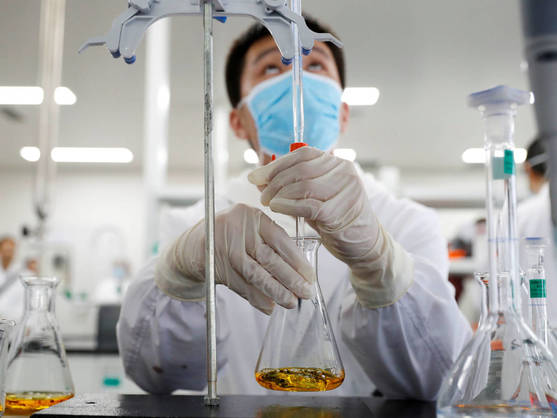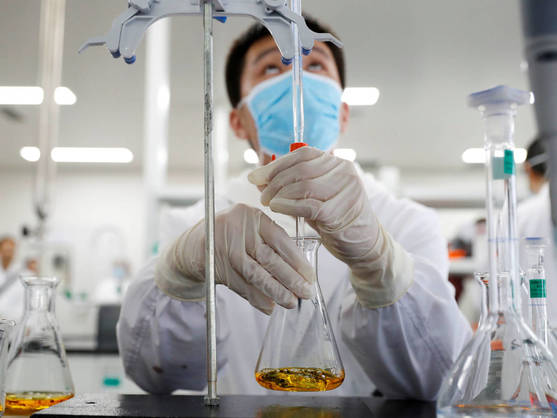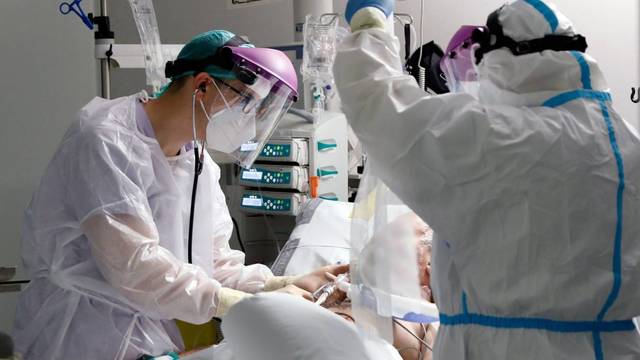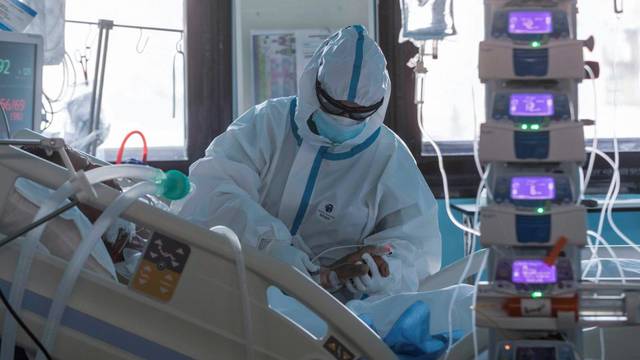
- Home
- News & Blog
- The blood sugar of COVID patients: the key that triggers mortality
The blood sugar of COVID patients: the key that triggers mortality
High blood glucose should be used to identify the subjects with a higher risk of suffering a poor evolution, according to a study that includes more than 11,000 Spanish patients.
In their daily fight against covid, doctors need more clues to deal with the flood of patients arriving at hospitals. Which ones are most at risk? How do you know who will evolve better or worse? The simplest data can be key in a disease that still has too many unknowns. In this search, a group of Spanish researchers have found a simple indicator but with tremendous predictive power : the blood sugar level.
Their study, published in the journal 'Annals of Medicine' , collects data on 11,312 patients from the first wave of the pandemic divided into three groups according to their level of glycemia (the concentration of free glucose in the blood) at the time of admission. : those with less than 140 mg / dl (milligrams per deciliter), those with between 140 and 180 mg / dl, and those that exceed 180 mg / dl. The differences are striking: while mortality among those with less sugar is 15.7%, it rises to 33.7% in the intermediate group and reaches 41.1% among those with hyperglycemia . The glucose level is also related to an increased need for mechanical ventilation and the risk of admission to the ICU.

The result has been obtained from the SEMI-COVID-19 Clinical Registry of the Spanish Society of Internal Medicine (SEMI), which includes data from thousands of patients from more than 200 hospitals in the country , and it is so clear that the researchers do not doubt in recommending measuring this parameter upon arrival of the patient at the hospital and, if it is high, acting to keep it at normal levels. In addition, they have verified that it is an independent risk factor that has nothing to do with age or other diseases, not even diabetes, because the problem is not that previous high levels of sugar increase the risk, but that the The virus triggers blood glucose levels and, in turn, this lack of control has detrimental effects on the evolution of COVID.
" It is a powerful marker, early and easy to measure, " Francisco Javier Carrasco Sánchez, a specialist in Internal Medicine at the Juan Ramón Jiménez Hospital (Huelva) and main author of the work, highlights in statements to Teknautas. "From the beginning we began to see that patients with high blood glucose suffered more complications and that other investigations detected blood glucose levels that were bordering on abnormality," he says. For this reason, as coordinator of the Diabetes, Obesity and Nutrition Group of the SEMI, he proposed this research that now shows an increasing curve of severe cases and mortality as a function of sugar levels at the beginning of hospitalization, without this parameter being able to be influenced by subsequent treatments.
Why it happens
Researchers believe that high blood glucose is a consequence of the infection itself and that it can at least be explained by a couple of causes. The first would be specific to covid, since receptors abound in the pancreas that allow the coronavirus to anchor itself to cells and infect them . The pancreas is the organ that produces insulin, which in turn lowers the level of sugar in the blood. For this reason, when it is attacked by SARS-CoV-2, "it is as if the virus produces a kind of temporary diabetes," says Carrasco. In fact, it is already known that this also occurs with other coronaviruses, but "in this case, it is especially important and has been demonstrated in other basic research results," he adds.
The second cause coincides with other viral infections and pathological processes and has to do with inflammation. "It is a well-known fact in medicine that those patients with an acute illness or multiple trauma can have a sudden rise in blood sugar even though they are not diabetic, it is what is known as stress hyperglycemia ", explains Ricardo Gómez Huelgas, head of Internal Medicine of the Regional University Hospital of Malaga and president of the SEMI. In the case of covid, experts believe it could be related to a strong exposure to the virus or a poor response to the infection. "What he is telling us is that the body is facing a significant aggression and reacts with this rise in blood sugar," he highlights.

From a pathophysiological point of view, this response makes sense because sugar is the main fuel for cells, so in stressful situations the body has to ensure that there is enough energy available to deal with the aggression. The problem is that this reaction has counterproductive side effects , because a high blood glucose environment facilitates the entry of SARS-CoV-2 into cells. This phenomenon "is not related to contagion", clarifies Carrasco, "but, once a patient is infected, the fact of having a lot of sugar in the blood favors the invasion of the virus, causing the disease to be more aggressive". Specifically, it facilitates the anchoring of the virus on cell receptors.
In stressful situations, the body has to ensure that there is enough energy available to deal with the aggression.
This completes the circle that leads to disaster : the virus causes a rise in sugar, the rise in sugar causes more infection at the same time as an increase in the inflammatory response, and the most serious covid patients are characterized, precisely, by suffering an exaggerated inflammation. "We are talking about the fact that hyperglycemia may be a mechanism that worsens the inflammatory response of patients with covid, which is the one that ends up causing damage to the lung and other organs", highlights Gómez Huelgas. In diabetic patients, the infection raises an already high blood sugar level even more and therefore they start at a disadvantage. However, in healthy subjects, the infection itself causes that sugar rise above normal, so that they can suffer the same problem, as the study shows.
The utility for patients
This chain of effects explains the research results, which surprise even specialists. More than 20% of the patients included died and their blood glucose seems to be a determining factor : "The risk of death during hospital admission is almost tripled among those patients who have a blood sugar at admission greater than 180 compared to those who have it below 140 ", recalls the president of SEMI. The good news is that these results can be very useful.

As a result of this publication and with the previous data that already existed, doctors began to take into account the parameter of blood sugar in all covid patients, whereas previously only those who already had a history of diabetes were monitored : "We are beginning to sensitize ourselves", assures Carrasco, "in some centers there are already specific protocols, especially for the detection of blood glucose". In fact, Spanish internists prepare a specific document with recommendations.
"If a patient has high blood glucose at the time of hospitalization, this indicator is already telling us that the body is reacting badly to the aggression of the virus ", comments the expert, "so we can optimize its management and treatment in a very early ". In that sense, the first thing would be to try to control hyperglycemia itself, avoiding a more aggressive infection and exaggerated inflammation.
In fact, this study serves to complete other research that has already pointed out the importance of controlling blood sugar during hospitalization. Patients with highly variable levels, with many ups and downs during their admission, do worse than those who maintain blood glucose levels within acceptable parameters.
An elevated blood sugar level would be a marker of poor prognosis of COVID that would join others already known.
With all these data, an elevated blood sugar level would be a poor prognostic marker for covid that would join others already known, such as inflammatory markers (ferretin or C-reactive protein, for example) or thrombotic markers (D-dimer) . "We are working hard to develop formulas that can predict the risk of the patient once they are admitted to the hospital. Thus, we see that there are a series of clinical and analytical markers that allow us to predict with a high probability which patients are at high risk of developing complications. ", says Gómez Huelgas.
In this case, the sugar level would be a new " simple and cheap indicator to stratify patients ." With this information, physicians can select the patients most at risk and anticipate available treatments, although currently they are limited to the use of corticosteroids for their anti-inflammatory effect and of heparin as an anticoagulant.
The president of the SEMI believes that the investigation leaves three clear messages. The first would be for patients: "If you are diabetic, control sugar well because this can protect you," he advises. The other two are for doctors. In the first place, "we have to analyze the blood glucose of any patient who is admitted, because it will serve to mark their prognosis , along with other parameters," he highlights. And if the sugar is indeed high, "it is important to control it during hospitalization, avoiding both the highs and the lows." - Jose Pichel
Visit https://keralty.com.ph/plans-and-deals/special-checkups for our special packages.
 Philippines
Philippines
 Keralty Global
Keralty Global

